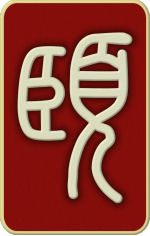
颐 Yí Nourishment (Food) [hexagram 27]


Mountain over Thunder
 Earth element
Earth element
Lunar month: 11 ; Host (controlling) line : 6
) %>
The Decision
Persistence with nourishment brings good fortune. Study the diet; be mindful of what is eaten.
‘Persistence with nourishment brings good fortune’ – when nutrition is correct all will go well. ‘Study the diet’ – taking care of those to be nourished. ‘Be mindful of what is eaten’ – pay attention of your own nourishment. Heaven and Earth nourish us all. The wise nourish people of talent and virtue in order to help everybody. Appropriate nourishment can achieve greatness!
颐: 贞吉. 观颐, 自求口实. Yí: zhēn jí. Guānyí, zì qiú kǒu shí.
颐贞吉, 养正则吉也. 观颐, 观其所养也; 自求口实, 观其自养也. 天地养万物, 圣人养贤, 以及万民; 颐之时大矣哉! Yí zhēn jí, yǎng zhèng zé jí yě. Guānyí, guān qí suǒ yǎng yě; zì qiú kǒu shí, guān qí zì yǎng yě. Tiān dì yǎng wàn wù, shèng rén yǎng xián, yǐ jí wàn mín; yí zhī shí dà yǐ zāi!
The Image
‘Nourishment’ is formed by Mountain over Thunder. The wise are heedful of what is said and also moderate in eating and drinking.
象传: 山下有雷, 颐; 君子以慎言语, 节饮食. Xiàng zhuàn: Shān xià yǒu léi, yí; jūn zǐ yǐ shèn yán yǔ, jié yǐn shí.
Line Change 1
Putting aside the magic turtle, staring with gaping mouth. Misfortune.
‘Staring with gaping mouth’ – an ungainly spectacle.
初九: 舍尔灵龟, 观我朵颐, 凶. Chū jiǔ: Shè ěr líng guī, guān wǒ duǒ yí, xiōng.
象传: 观我朵颐, 亦不足贵也. Xiàng zhuàn: Guān wǒ duǒ yí, yì bù zú guì yě.
Line Change 2
Seeking nourishment from below is inappropriate while seeking nourishment from above – leading to misfortune.
Second ‘six’ leads to trouble – attempting progress without the help of others.
六二: 颠颐, 拂经, 于丘颐, 征凶. Liù èr: Diān yí, fú jīng, yú qiū yí, zhēng xiōng.
象传: 六二征凶, 行失类也. Xiàng zhuàn: Liù èr zhēng xiōng, xíng shī lèi yě.
Line Change 3
Ignoring hunger despite persistence leads to misfortune. Inactivity for ten years will serve no purpose.
‘Inactivity for ten years’ – is contrary to the proper way.
六三: 拂颐, 贞凶, 十年勿用, 无攸利. Liù sān: Fú yí, zhēn xiōng, shí nián wù yòng, wú yōu lì.
象传: 十年勿用, 道大悖也. Xiàng zhuàn: Shí nián wù yòng, dào dà bèi yě.
Line Change 4
Seeking nourishment from below – fortunate. Following a tiger’s glare with relentless craving. There is no blame.
Fortune from ‘seeking nourishment from below’ shows the power of a superior position.
六四: 颠颐, 吉, 虎视眈眈, 其欲逐逐, 无咎. Liù sì: Diān yí, jí, hǔ shì dān dān, qí yù zhú zhú, wú jiù.
象传: 颠颐之吉, 上施光也. Xiàng zhuàn: Diān yí zhī jí, shàng shī guāng yě.
Line Change 5
Turning aside from the usual way but if steadfast all will be well. A great journey should not be undertaken.
‘If steadfast all will be well’ – because it is appropriate to follow the one above.
六五: 拂经, 居贞吉, 不可涉大川. Liù wǔ: Fú jīng, jū zhēn jí, bù kě shè dà chuān.
象传: 居贞之吉, 顺以从上也. Xiàng zhuàn: Jū zhēn zhī jí, shùn yǐ cōng shàng yě.
Line Change 6
At the source of nourishment, some peril but fortunate. A great journey will be advantageous.
The good fortune, despite the adversity ‘at the source of nourishment’ is a cause for celebration.
上九: 由颐, 厉吉, 利涉大川. Shàng jiǔ: Yóu yí, lì jí, lì shè dà chuān.
象传: 由颐厉吉, 大有庆也. Xiàng zhuàn: Yóu yí lì jí, dà yǒu qìng yě.
The full set of 64 English translations is available in our new book 'Book of Changes - Deciphered' ➚.